
Games
42
RPGS
55
Arcade Games
34
Puzzle Games
18
Platform Games
10
Strategy Games
Sections
QB
News
Site
Archives
Game
Guides
Our
Projects
Entertainment
Awards
Page
QB
Links Page
Interact
Discussion
Board
The
QB Chatroom
Mailing
List
Submissions
Link
to Us
Job
Openings
Email
VPlanet!
Affiliates
The
QB Times
Future
Software
Abyssware
Studios
Clockwerk
Productions
Darkside
Productions
Game
Developer's Refuge
GBGames
QBasic
Master
Creating
NeoBasic
Pete's
QBasic Site
Pickers
Games Website
Programming
Oasis
Programming
ShareHouse
QB:
Cult Magazine
QB
on Acid
QB:
The Magazine (Archives)
QBasic/QuickBasic
News
QuickBasic
RPGs
Secret
Weapon Software
Sneukeule's
QBRPG Page
StattoNet
Disclaimer
The
software reviewed and/or downloadable in this site, along with any related
images presented or concepts related to the software, belongs to its respective
people, companies, and development teams. All downloadable titles in this
site are "freeware", and the source of each software is clearly stated.
The opinions presented regarding such software does not reflect the views
of its creators; the intention of this site is to inform and pay tribute
to the many programmers who have chosen QuickBasic 4.5.
Any additional images and/or news gathered to this site from another source belongs to its respective owners, and is intended to advertise the source and promote its theme.
If
you have any problems concerning the contents of this site, please contact
our staff at
vancevelez@yahoo.com.
The first 100% QuickBasic game Review magazine
Improving Your QB Game's "Shelf Life"
(5/12/2001) Does you QB game have what it takes to live forever in the heart of your friend's hard drive? We'll give you a few steps to show you how.
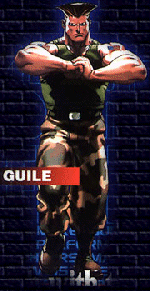 Is
it just me or has it been a while since the console companies really developed
videogames that were good enough to have ready at all times for play? Given,
you have your occasional Final Fantasy IXs, Metal Gear Solids,
Zelda
64s, and Soul Caliburs. But these gems are really too few and
far between in the videogame market these days, with only the most veteran
of game companies producing blockbuster after blockbuster title. As a result,
many third parties in the Playstation 2/Gamecube/XBox generation resort
to making titles based on tried and true formulas that gamers have already
seen before.
Is
it just me or has it been a while since the console companies really developed
videogames that were good enough to have ready at all times for play? Given,
you have your occasional Final Fantasy IXs, Metal Gear Solids,
Zelda
64s, and Soul Caliburs. But these gems are really too few and
far between in the videogame market these days, with only the most veteran
of game companies producing blockbuster after blockbuster title. As a result,
many third parties in the Playstation 2/Gamecube/XBox generation resort
to making titles based on tried and true formulas that gamers have already
seen before.
Perhaps this slowing down of videogame innovation is rubbing off on the QB game library. I'm not inferring that the quality of QB games will be going down in the future. I would be an idiot to say that new QB games like PHAT Professional Burglar, Project: Zeta, Ghini Run, and Shadow Legend 2 are nothing short of highly addictive and original QB games. But the majority of QB games I've seen so far have yet to eclipse these classics in the category I'm going to talk about right now.
That's right: this editorial is a quick and dirty lesson on giving your game some Replay Value. This is the one X-factor in V Planet game reviews because no amount of programming knowledge is going to make or break your game in this category. It's all about how entertaining your game is, and that's in huge part to gameplay and fun factor. And we've all played games that excel in these categories while not shining in the more technical aspects.
There is no clear road map to achieving a high replay value score. But QB programmers have found five solid techniques in game development that increase their replay values. Here are the five main principles you need to follow:
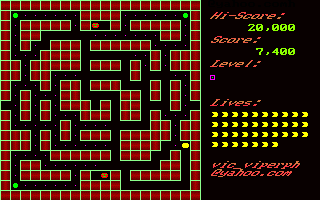
1) Reward Players Who Have Played Your Game Through
One way to boost your replay value is by adding a new way for gamers to play your game. This is why fighting games tend to thrive because they offer different characters with a new set of moves to learn. Eric Lope's Pacmanoid is a great example of this, as the game gives you a cheat code after playing it the first time through for infinite lives, and this gives you the opportunity to experiment with the ghost AI.
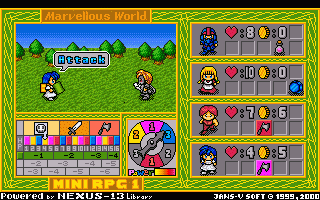
2) It's best to innovate, but the best gameplay is like an old friend!
Instead of trying to produce another clone of a console game that's been done dozens of times over, try either an original idea of your own or a type of game that just hasn't been played in a while. A great example of this is JawsVSoft's Mini RPG 1 Board Game, which combines their popular RPG gameplay elements with a boardgame layout. Throw in some good graphics and you've got a good all-around game.
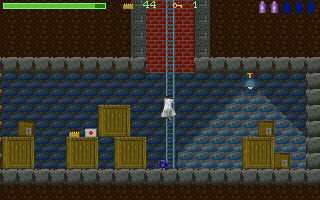
3) Provide More Than One Way to Play the Game
Too many games get frustrating because there are too many parts where there's really only one way to get past the game level. Platformers in particular pay the price for this. If you have to kill the same exact enemies the same exact way to pass a level, it can make it more challenging, but it's a lot less fun to play. On that note, PromZone is the best example of a platformer that does Rule #3 the right way. With multiple paths within the same game level, and mutliple ways to beat the enemies (all while conserving a good challenge level), this one-level platformer is worth many visits.
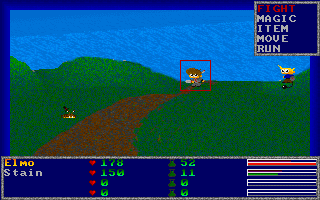
4) A Game Can Never Have Too Many Secrets
Nothing beats the feeling of picking up a videogame you've played before, giving a little thought, and then discovering something you can do in the game that you didn't know was possible. PHAT Games capitalized on this idea by adding mini-games to Kids of Karendow: Chapter 1 Dawn of a Revolution. A few of the most fun ones are fiendishly hidden by PHAT Games, encouraging gamers to play the game again after finishing it.
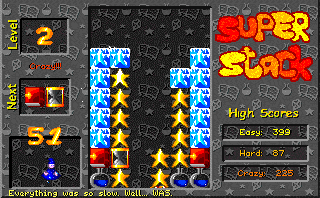
5) High Fun Factor Will Push the Replay Value
It's a lot easier to measure high fun factor in a QB game than high replay value if you're a programmer or a beta tester. Simply play through your product as it's being made. If something doesn't seem fun, take it out. By process of elimination, if you preserve only the parts of the game that add to the gameplay and make the game more fun, then you're bound to have a higher replay value as well. With enough fine-tuning, you may even make a game as addictive as Oren Bartal's Super Stack.
Vance Velez
Editor, V Planet! QuickBasic Magazine